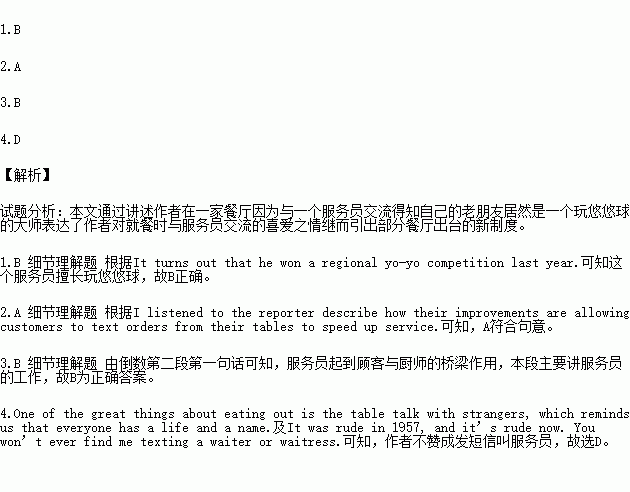题目内容
Thanks to a young waiter, I recently found a friend of 20 years was once a yo-yo virtuoso(大师).
“Oh, stop it!” Jackie said when I started laughing during our dinner. “I was, too. And I knew how to ‘Walk the Dog.’”
“Wow, really?” said our waiter, Jumario Simmons, flashing a big smile at us.
“Don’t encourage her,” I said.
“What else could you do?” he asked.
“I did ‘Round the World,’” Jackie said, now ignoring me completely. “That was cradle(婴儿时期的)thing, too.”
I’d asked Jumario what he did when he wasn’t waiting on tables. The 24-year-old waiter was so smart that I knew there had to be more to his story. It turns out that he won a regional yo-yo competition last year. He also gives free lessons to kids. “It gives them something to do,” Jumario said. “Keeps them off the streets.”
One of the great things about eating out is the table talk with strangers, which reminds us that everyone has a life and a name. But the other day I heard that some restaurants are ending this talk between diners and servers. I listened to the reporter describe how their improvements are allowing customers to text orders from their tables to speed up service.
The reporter got my attention with this sentence “Five minutes after typing ‘I’m at table 3’, a meal arrives at the table.” But there wasn’t a “please” with this order, which should have been a request. If you’ve ever waited on tables, you know that the last thing you need is yet another way for a customer to be unpleasant.
Most servers are often mediating(调解)between customers’ requests for substitutions and overworked cooks’ accusations of treason(背叛). Except at high-end restaurants, servers also have to walk back and forth like mothers of preschoolers so that we might consider them worthy of a large enough tip to lift their pay to minimum wage.
Texting a server from a table a few feet away is equal to moving our fingers and shouting, “Hey, you!” It was rude in 1957, and it’s rude now. You won’t ever find me texting a waiter or waitress.
1.What do we know from the text?
A. The waiter knows Jackie well.
B. The waiter is good at playing yo-yo.
C. Jackie plays yo-yo in her spare time.
D. The author has a great interest in playing yo-yo.
2.Some restaurants allow diners to text a server from a table to ________.
A. improve their service
B. reduce the cost of service
C. show respect for diners
D. stop talks between diners and servers
3.What’s the last but one paragraph mainly about?
A. The pay of servers.
B. The work of servers.
C. The customers’ request.
D. The work of mothers of preschoolers.
4.From the passage, the author’s attitude towards texting a server from a table is ________.
A. indifferent B. positive
C. curious D. negative
 阅读快车系列答案
阅读快车系列答案
